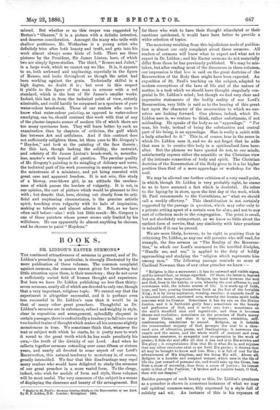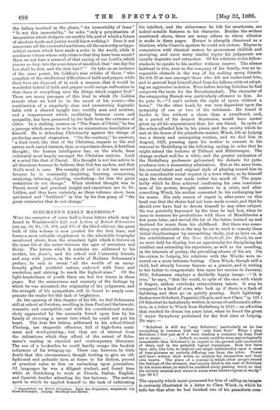BOOKS.
DR. LIDDON'S EASTER SERMONS.* THE continued attractiveness of sermons in general, and of Dr. Liddon's preaching in particular, is strongly illustrated by the mere publication of these volumes. The common complaint against sermons, the common reason given for bestowing but little attention upon them, is their monotony ; they do not cover a sufficiently varied field of human thought and experience. But here we have Dr. Liddon publishing no less than thirty- seven sermons, nearly all of which are devoted to only one, though that a very important, religious topic. We cannot say that the -experiment is altogether successful, and it is perhaps even less successful in Dr. Liddon's case than it would be in that of many other great preachers. Thoughtful as Dr. Liddon's sermons are in substance, refined and weighty in style, clear in exposition and arrangement, splendidly eloquent in certain passages, there is undoubtedly a tendency to fall into one or two limited trains of thought which makes all his sermons slightly monotonous in tone. We sometimes think that, whatever the text or subject with which he starts, he is pretty sure to work it round to the great truth which he has made peculiarly his own,—the truth of the divinity of our Lord. And when he collects together sermons extending over some fifteen or sixteen years, and nearly all devoted to some aspect of our Lord's Resurrection, this natural tendency to monotony is, of course, greatly intensified. We fear that this disadvantage may repel many readers who would have delighted to study the sermons of our great preacher in a more varied form. To the clergy, indeed, who wish for models of form and style, these volumes will be most useful. The very sameness ef the subject is a means of displaying the clearness and beauty of the arrangement. But
• Easter in Bt. Paul's: Sermons bearing chiefly on the Resurrection of our Lord. By H. P. Liddon, D.D. London : Risingtons. 1885.
for those who wish to have their thought stimulated or their emotions quickened, it would have been better to provide a wider selection of topics.
The monotony resulting from this injudicious mode of publica- tion is almost our only complaint about these sermons. All readers of sermons will know what to expect and what not to expect in Dr. Liddon ; and his Easter sermons do not materially differ from those he has previously published. We may be mis- taken, but after reading most of the discourses in these volumes, our impression is that less is said on the great doctrine of the Resurrection of the Body than might have been expected. An exposition of St. Paul's teaching on the subject, adapted to modern conceptions of the laws of life and of the nature of matter, is a task which we should have thought singularly con- genial to Dr. Liddon's mind ; but though we find very clear and impressive statements of the bodily reality of our Lord's Resurrection, very little is said as to the bearing of this great fact upon the character of the resurrection to which we our- selves are looking forward. One phrase, indeed, which Dr.
Liddon uses is, we venture to think, rather unfortunate, if not misleading. He speaks of the body as an "appendage." "For man, his body, instead of being the substantive and central part of his being, is an appendage. Man is really a spirit with a body attached to it." This is, of course, true in the sense in which Dr. Liddon uses it, and we do not forget that he adds that man is to receive this body in a spiritualised form here- after. But the phrases we have quoted do not, to our minds, satisfactorily express either the scientific or the Christian view of the intimate connection of body and spirit. The Christian doctrine of the Resurrection of the Body gives to it a far higher position than that of a mere appendage or workshop for the soul.
We may be allowed one further criticism of a very small point, in which, though Dr. Liddon is very probably right, he seems to us to have assumed a fact which is doubtful. He refers to the laying-by in store, upon the first day of the week, which St. Paul recommends to the Corinthians, as " what we should call a weekly offertory." This identification is not certainly supported by the passage in question, which may refer only to a private setting-apart of a certain sum for alms, and not to any sort of collection made in the congregation. The point is small, but not absolutely unimportant, as we know so little about the earliest form of service, that any similarity with later practices is valuable if it can be proved.
We are more likely, however, to be right in praising than in criticising Dr. Liddon, as any one will perceive who will read, for example, the fine sermon on "The Reality of the Resurrec- tion," in which our Lord's command to the terrified disciples, "Handle me, and see," is applied to the duty of boldly approaching and studying the "religion which represents him among men." The following passage reminds us more of Cardinal Newman than of any other preacher we know :—
"Religion is like a sacrament ; it has its outward and visible signs, and its inward fact, or things signified. Of these, the latter is, beyond dispute, the more important. Religion, the bond between the soul and God, lives in the habits, or acts, whereby the soul adheres to, and communes with, the infinite source of life. It is made up of faith, hope, and love, pouring themselves forth at the feet of the Invisible King ; it is by turns aspiration, worship, resolve ; it expends itself in a thousand unheard, unuttered acts, whereby the human spirit holds converse with its Creator. Sometimes it has its eye on the Divine Justice, and it is forthwith godly fear; sometimes on the beauty and perfection of God, and it melts into love ; sometimes on the sonl's manifold sins and ingratitude, and then it becomes shame and confusion ; sometimes on the promises of God's mercy in Jeans Christ, and then it is repentance, contrition, self. condemnation, resolutions to amend. Religion, as it beholds the transcendent majesty of God, prompts the soul to a thou- sand acts of adoration, praise, and thanksgiving ; it summons the angels and the saints, and the whole world of sentient and even inanimate creatures, to sympathy and co-operation in the work of praise; it bids the soul offer all that it has and is to His service and His glory ; it congratulates Hitn that He is what He is, and rejoices that any other creatures exist to set forth His praise ; it desires that all may be brought to know and love Him ; it is fall of zeal for the advancement of His kingdom, and the doing His will. Above all, Religion is a humble and resigned temper, which sees in the ills of life the just reward of personal sin, and would take up the Cross, less from a sense of necessity, than from a sense of justice ; its inmost spirit is that of the Psalmist, A broken and a contrite heart, 0 God, thou wilt not despise.' "
Besides passages of such beauty as this, Dr. Liddon's greatness as a preacher is shown in numerous instances of what we may
call spiritual common-sense, fitly expressed by a style full of subtlety and wit. An instance of this is his exposure Of the fallacy involved in the phase, "An immortality of fame." "18 not this immortality," he asks, "only a perpetuation of inequalities which disfigure our earthly life, and of which a future of absolute truth and justice would know nothing ? Does it not consecrate all the successful ambitions, all the unworthy or hypo- critical careers which have made a noise in the world, while it condemns virtues whose only crime is that they have been secret ? Have we not here a reversal of that saying of our Lord's, which pierces so deep into the conscience of mankind, that 'one day the last shall be first, and the first last ?' " Or take as an instance of the same power, Dr. Liddon's wise rebuke of those "who complain of the intellectual difficulties of faith and prayer, while their lives are disposed of in such a manner, that it would be wonderful indeed if faith and prayer could escape suffocation in that chaos of everything save the things which suggest God." There are many passages of this kind in which Dr. Liddon reveals what we bold to be the secret of his power,—the combination of a singularly clear and unwavering dogmatic faith with a shrewd insight into worldly men and motives, and a temperament which, oscillating between scorn and sympathy, has been preserved by his faith from the extremes of either. In a striking sermon on "The Peace of Christ," he has a passage which seems to us to be an unconscious description of himself. He is defending Christianity against the charge of producing mental stagnation. "On the contrary," he answers, "a fixed creed, like that of the Christian, imparts to life and nature such varied intereet, that, as experience shows, it fertilises thought ; the human intelligence has, on the whole, been cultivated most largely amongst the Christian nations. Look at a mind like that of Pascal. His thought is not less active in all directions because he believes that God has spoken, and that God's word is sure. His serenity of soul is not less assured because he is constantly inquiring, learning, comparing, analysing, inferring, objecting, concluding ; for him the great certainties do not change." What abstract thought was to Pascal, moral and practical insight and experience are to Dr. Liddon, and they have certainly, as these volumes show, been quickened and "fertilised" in him by his firm grasp of "the great certainties that do not change."



































 Previous page
Previous page